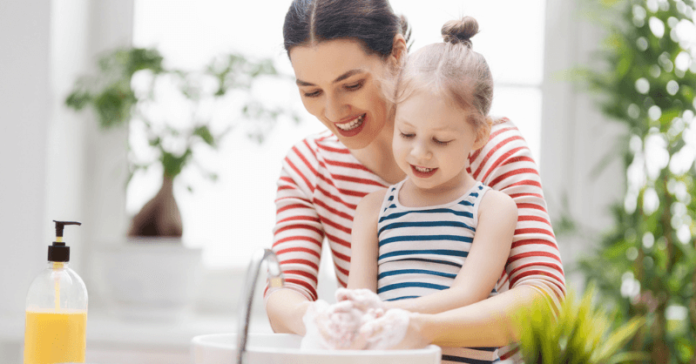Children find it difficult to understand why he or she needs to be clean. If you want them to follow what you teach you will have to practice it as well. Habits learnt in childhood are likely to be followed after becoming an adult as well.
Rather than telling your child to do certain thing explain them the rationale behind hygiene and why they should
- Take a bath daily
- Shampoo hair regularly
- Brush teeth twice in a day
- Wash hands with soap
- Clean his/her nose using a tissue
- Cover mouth while coughing or sneezing;
- Cut and comb hair to keep it clean
- Keep nails short and clean
If you explain your child the need for hygiene they are more likely to follow instructions regarding bathing, brushing, and combing. Hygiene is important but don’t become obsessive to keep your children clean. Remember that he or she is a child and children do become dirty and cannot be spotless. It is important to keep children clean but let him or her explore the world as well.
Certain hygiene measures that you should make your child practice regularly are
- Bathing: Encourage your child to bath daily in the morning before going to school and in summers in the evening as well. Older children have to be taught personal hygiene as well like washing underarm and genital region. This is very important for older girls who have started having periods. Teach them how to clean their genitals well.
- Oral Hygiene: Make your child realize the importance of brushing thoroughly twice a day (in the morning, and before sleeping at night). Teach your child about dietary influences on his/her teeth rather than saying no for certain foods. Explain why they should avoid having too much sweets, biscuits and fizzy drinks. Explain them that food left in the teeth and gums can cause tooth decay or caries. Encourage good eating habits.
- Hand Washing: Washing hands is the most important aspect of hand care that you can teach your child. It is considered as one of the best ways to prevent infection and spread of germs. Children learn by seeing or watching. Wash your hands often with them so that they learn how to wash well and get the message that it is an important and good habit. Teach your child to use soap to wash hands. Ensure that while washing hands your child makes the soap lather and scrubs his or her hand using friction for a minimum of 15 to 20 seconds. Remind your child to wash under the cuticles, the fingernails, between the fingers and the back of the hands. Stress on washing hands properly after going to the washroom, before and after eating and drinking, and touching and preparing food.
- Nail care: Teach your child about nail care and ensure that bad habits like chewing and biting nail, keeping long nails is discouraged. Remind your child to wash under the cuticles, and fingernails while washing hands. Teach your child to cut nails regularly as bacteria accumulate under long nails. Pay attention to your child’s toe nails as well. Cut them to keep the nails small and teach your child to wash feet thoroughly daily and apply moisturizer.
- Feet washing: Children should be trained how to wash their feet, between the fingers, under the nails; and if required the use a nail brush. This keeps the feet clean and infections such as athlete’s foot and ringworms are also less likely to occur. They should be encouraged to use an individual towel if they have an infection.
- Hair Care: Explain your child importance of hair care and teach your child hair care and hair hygiene measures. Teach your child to wash his or her hair and let them wash hair every other day and if required daily in…


